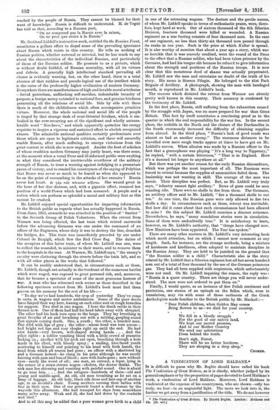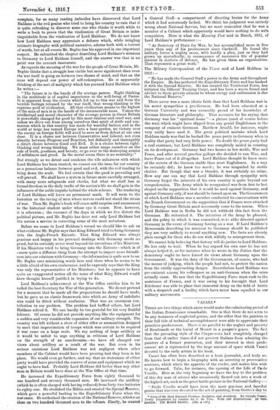A VINDICATION OF LORD HALDANE.* IT is difficult to guess
why Mr. Begbie should have called his book The Vindication of Great Britain, as it is chiefly, whether judged by its general emphasis or by the proportion of pages devoted to Lord Haldane's work, a vindication of Lord Haldane. Moreover, Lord Haldane is vindicated at the expense of his countrymen, who are shown—odly too truly, we fear—in an ungrateful light. The more we look into it, the further we get away from a justification of the title. We do not however
• TIN Vindication of Great Britain. By Harold Begble. London : Methuen and CO. Ka. nett
complain, for so many ranting imbeciles have discovered that Lord Haldane is the evil genius who tried to bring his country to ruin that it is quite refreshing to discover some one who thinks it worth while to write a book to prove that the vindication of Great Britain is indis- tinguishable from the vindication of Lord Haldane. We do not know how Lord Haldane may appreciate a defence which, while mingling intimate biography with political narrative, adorns both with a torrent of words, but at all events Mr. Begbie has his approval in one important respect. He submitted the chapter describing Lord Haldane's missions to Germany to Lord Haldane himself, and the answer was that in no point was the account inaccurate.
As regards the meaning of the war for the people of Great Britain, Mr. Begbie thinks that a struggle less visible but more significant than even the war itself is going on between two classes of mind, and that on the issue will depend our power of self-redemption. He is apparently thinking of the sort of malignity which has pursued Lord Haldane when he writes :—
- " The future is in the hands of the average person. Right-thinking in the multitude is of capital importance to the well-being of States. It is apparent from the events which led up to this war and from the terrible feelings released by the war itself, that wrong-thinking is the supreme peril of civilization. All that civilization means to the highest of the sons of men is in the hands of the innumerable mass. Unless the intellectual and moral character of the average person in Great Britain is powerfully changed for good by this most ruinous and cruel war, and unless we drive out from among ourselves that spirit of strife and con- tention which in this country has made for wasteful faction and in the world at large has turned Europe into a bear-garden, no victory over the enemy on foreign fields will avail to save us from defeat at our own door. It is a choice not between Conservative and Liberal, not even directly between Progress and Reaction, but definitely and inescapably a direct choice between Good and Evil. It is a choice between right- thinking and wrong-thinking. We must either range ourselves on the side of truth, goodness, and beauty, or go over to the destroying armies of selfishness and greed. In the moral arena there is no neutrality." But strongly as we detest and condemn the vile unfairness with which Lord Haldane has been treated, we cannot see the issue for our country as a precarious balance between good and evil, with the evil tending to bring down the scale. We feel certain that the good is prevailing and will prevail. We shall have a system in future more carefully arranged, with many more safeguards and checks, but what we shall lose in formal freedom in the daily traffic of the nation's life we shall gain in the influences of the noble impulse behind the whole scheme. The traducing of Lord Haldane will leave no permanent mark. It will seem to the historian as the raving of men whose nerves could not stand the strain of war. Then Mr. Begbie's book will cause mild surprise and amusement in the historical student under whose eye it comes. Now, however, it is otherwise ; the excesses of the days in which we live distort the political picture, and Mr. Begbie has done not only Lord Haldane but the nation a service in correcting some of the most notorious.
Before we come to Lord Haldane's record we should like to ask on what evidence Mr. Begbie says that King Edward tried to bring Germany into the Anglo-French Entente. That King Edward was always gracious and happy in his personal dealings with Germany needs no proof, but he certainly never went beyond the intentions of his Ministers. If his Ministers tried to bring Germany into the Entente—which is of course quite a different thing from the attempt to import more friendli- ness into our relations with Germany—the information is quite new to us. Mr. Begbie uses minimizing words here and there when he seems to be a little afraid of his own exuberance, and he expressly says that the King was only the representative of his Ministers ; but he appears to have quite an exaggerated notion all the same of what King Edward would have thought himself justified in trying to do.
Lord Haldane's achievement at the War Office entitles him to be called the best Secretary for War of this generation. We do not pretend for a moment that he made all the preparations he should have made, but he gave us an elastic framework into which an Army of indefinite size could be fitted without confusion. That was an enormous con- tribution to our problem. The problem had baffled others, but Lord Haldane solved it. We can hardly be too grateful for his very fruitful labours. Of course he did not provide anything like the equipment for a sudden and very considerable expansion of our military strength. The country was left without a store of either rifles or ammunition designed to meet that improvisation of troops which was certain to be required if war came on a large scale. We say nothing of large artillery as it would be unfair to urge anything in criticism of Lord Haldane on the strength of an anachronism—we have all changed our views about artillery as a result of the war. But even in his serious omissions Lord Haldane was not negligent where other members of the Cabinet would have been pressing had they been in his place. We would even go further, and say that no statesman of either party would have provided the reserve of arms and equipment which we ought to have had. Probably Lord Haldane did better than any other man in Britain would have done at the War Office at that time.
He increased the Expeditionary Force from eighty thousand to one hundred and seventy thousand men. He increased the artillery (which he is often charged with having reduced) from forty-two batteries to eighty-one. He abolished the Militia and created the Special Reserve, which gave a powerful backing to the Expeditionary Force when the test came. He authorized the creation of the National Reserve, which sent close on two hundred thousand men to the colours. Finally, he created a General Staff—a compartment of directing brains for the Army which it had notoriously lacked. We think his judgment was entirely
wrong about National Service, but we must remember that ho was a member of a Cabinet which apparently would have nothing to do with compulsion. Here is what the Morning Post said in March, 1911, of Lord Haldane's performance :-
" As Secretary of State for War, ho has accomplished more in five years than any of his predecessors since Cardwell. He found the military forces a mighty maze, with hardly a plan, just as they had grown up sporadically, in consequence of successive fits of popular interest m matters of defence. He has given them an organization. That represents a great work."
The Military Correspondent of the Times said of Lord Haldane in 1912 :— " He has made the General Staff a power in the Army and throughout the Empire. He has perfected the Expeditionary Foroo and has backed it with the Special Reserve. He has created the Territorial Force, has initiated the Officers' Training Corps, and has been a warm friend and adviser to those private citizens to whose energy and enthusiasm is due the National Reserve."
There never was a more idiotio fable than that Lord Haldane was in his secret sympathies a pro-German. He had been educated at a German University and was excusably proud of his knowledge of German literature and philosophy. That accounts for his saying that Germany was his " spiritual home "—a phrase (used of course before the war) which might have slipped from any genial Englishman in the company of eminent Germans. Matthew Arnold, for instance, might very easily have used it. The great political mistake which Lord Haldane made was that he backed the peace party in Germany when in reality that party had very little power. No doubt the peace party had a real existence, but Lord Haldane was completely misled in counting on its development. Germany had two horses in her stable, War and Peace, and after several practice gallops she decided to run War, and leave Peace out of it altogether. Lord Haldane thought he know more of the secrets of the German stable than most Englishmen. In a way he certainly did ; he knew too much ; he was misguided by stable chatter. But though that was a blunder, it was certainly no crime. How any one can say that Lord Haldane through sympathy with Germany forgot the interests of his own country is quite beyond our comprehension. The Army which he reorganized was from first to last shaped on the supposition that it would be used against Germany, and against Germany only, if war should be forced upon us. The Government of which Lord Haldane was a member conducted its conversations with the French Government on the supposition that if Franco wore attacked by Germany Great Britain must necessarily come to the rescue. When • Lord Haldane was in Berlin he did not withhold this fact from the Germans. He reiterated it. The intention of tho Army ho planned, and the policy to which it was committed, were alike directed against Germany in the event of Germany forcing on a war. If Lord Haldane's Memoranda describing his missions to Germany should bo published they are very unlikely to reveal anything new. The facts are already plain enough for those who do not wish wilfully to misrepresent them.
We cannot help believing that history will do justice to Lord Haldane. He has only to wait. When ho has argued his own case ho has not always helped it, as for instance when ho wrote in the Nation that the democracy ought-to have forced its views about Germany upon the Government. It was the duty of the Government, of course, who had the means of judging, which the people had not, to protect the nation from the visibly approaching danger. Nevertheless Lord Haldane was pre-eminent among his colleagues as an anti-Gorman when the crisis actually came. He saw that the Expeditionary Force must rush to the assistance of France, and it was owing to his foresight that Lord Kitchener was able to place that immortal Army on the field of battle with a despatch and a facility which have never been equalled in our military movements.















































 Previous page
Previous page